Introduction
Divorce is a legal process of terminating a marriage. The decision to divorce is made by parties involved in the union, that is, husband and wife or any other arrangement. Several laws have been put in place in the US to govern the process of divorce. These regulations depend on the state the couple is living in. Whenever an application for a divorce is placed before the court system, it is the jurisdiction of any legal authority to deny or authorize the request on the basis of existing laws. In the US, the divorce procedure often involves property sharing, child custody, support, and distribution of debt among others (Eaton 38). Several reasons are associated with divorce such as incompatibility, infidelity, and unsolvable family or personal differences. Despite these reasons, divorce remains a challenge since it subjects the parties involved to stress and destroys families. It is therefore important to carry out a comprehensive research to examine the causes of divorce, its impact, and potential modifications to the law to make it harder. This proposed research study examines the above variables through an online primary survey to capture personal insight into the topic of divorce on whether it is necessary to tighten laws to ensure that the number of divorces is reduced.
Research Background
In the US, the Matrimonial Causes Act of 1973 is the main law governing the divorce process in the court. The protagonists and antagonists of divorce have agreed that this law is limiting and unsatisfactory because of emerging fault lines in implementation. In order to amend this law, a reform bill was created in the form of the Family Law Act 1996 (FLA) (Scott et al. 136). However, this amendment has not been fully integrated in the judicial processes leading to a divorce. The justification for divorce has also quickly shifted from a slow process to a relatively easy approach. For instance, the determinants of marriage have changed from using the family institution as a symbol of lifelong commitment to an institution of constant self-fulfillment. This means that many modern marriages are not based on lifetime commitment, but what each couple considers fulfilling (Eaton 36). Thus, a couple may easily file for a divorce when simple or selfish goals are no longer fulfilled by either of the partners. This trend is inconsistent with the Matrimonial Causes Act 1973 (MCA), which aimed at attempting to encourage the warring couple to stick longer in the marriage institution (Figley 45).
Specifically, the process should be slow and arduous to discourage divorce as a quick fix solution to personal differences. Although the MCA act permits divorce on the grounds of irretrievable marriage breakdown, couples must prove these irreconcilable differences within the five fact sheet list. The primary facts for permitting divorce are unreasonable behavior, adultery, desertion for at least two years, irreconcilable differences, and five years of separation. Apparently, the last three fact sheets are a sufficient argument for a quick divorce (Scott et al. 141). Due to such weaknesses in the law, “virtually any spouse can assemble a list of events which, taken out of context, can be presented as unreasonable behavior sufficient to found a divorce petition” (Figley 56). Therefore, in reality, the quick divorce option readily available has made separation proceeding in the court of law easy and almost effortless. These faults are affecting the marriage institution and family as a whole since a partner might decide to walk out of a matrimonial union at any time by just presenting one fact from the list of the five grounds for divorce. Thus, there is a need to carry out a comprehensive survey to examine the causes of divorce, impacts, and potential strategies to reduce the divorce rate.
Research Objectives and Questions
The primary objective of this research study is to establish the divorce rate among different population samples in terms of impacts and what should be done to minimize it. Specifically, the proposed objectives are:
- To establish the causes of divorce in modern American families
- To find out the percentage of divorce rate and impacts
- To identify what could be done to reduce divorce through legal amendments
From the above objectives, the following research questions were formulated by the researcher to address the scope of the study:
- What is the main cause of divorce?
- Do you think the divorce rate is increasing?
- Do you think that divorce should be a harder process?
- What are the options to stop a divorce?
- Are there benefits of reduced divorce to the society?
Research Significance
The findings of this research study will contribute to the existing literature on the need for controlled divorce by making the laws harder for those seeking separation. Moreover, the results might be used to influence policy formulation and future amendments that are aimed at making it difficult for couples to file for a divorce.
Literature Review
Current Loopholes in the Divorce Laws
The main loophole that is often exploited as a reason for justifying divorce is irreconcilable differences. Since the modern lifestyle does not appreciate marriage as a symbol of a lifetime commitment to a partner, it has become easy to exit this union as long as the petitioner can prove one of the five fact sheets. For instance, it would be easy to prove separation for a period of two years simply by moving out of the matrimonial home for the same period and then filing for a divorce (Eaton 39). Moreover, the law permits incompatibility, as grounds for divorce. With minimal regulations on what is considered incompatible, a petitioner might exploit this loophole to create an environment for hostility to prove irreconcilable differences. In addition, the Matrimonial Causes Act of 1973 does not encourage a prolonged and tedious divorce process that could be used to discourage separation or promote reconciliation (Figley 33). As a result, the marriage institution has been exposed to high rates of divorce as a partner can easily leave as long as he or she is able to prove any of the five requirements for permitting the annulment.
Causes of Divorce
Several factors have been associated with divorces such as violence, infidelity, debt, irreconcilable differences, and behavior considered abnormal. For instance, violence in modern families due to financial and other economic stresses or substance abuse might lead to divorce. Many young marriages are grappling with an unending debt cycle due to hard economic times (Scott et al. 140). This condition makes it difficult for couples to get self-fulfillment in marriages and they might easily snap and file for a divorce. For example, a couple who cannot agree on anything might opt for divorce as a solution to these differences. In addition, any proof of infidelity is grounds for separation and eventual divorce as stipulated in the law (Gravningen et al. 13). Instances of infidelity in the modern marriage institution are on the rise as many couples cannot get sexual satisfaction due to conflicts, which affect their sex life. Moreover, the free lifestyle might be tempting to young couples to engage in extra marital affairs (Eaton 34). These affairs are a threat to the marriage institution since a petitioner might exploit this situation to file for a divorce, especially when there is sufficient proof.
Potential Benefits of Reduced Divorce
Many benefits are associated with reduced divorce such as stable and complete families, reduced wastage of resources, preservation of wealth, and happy child upbringing. For instance, societies that make divorce difficult encourage lifetime commitment, which translates to a stable, predictable, and relatively focused family institution. Moreover, children raised in complete families tend to be happier and more fulfilled than children who have been victims of divorce (Eaton 36). In addition, families that have not opted for divorce have better and structured emotional support systems.
Methodology
Research Design
Since the proposed research is focused and dynamic, the researcher selected qualitative research using closed-ended questions. A ten-item online primary survey was selected to collect data. The rationale for qualitative research design was informed by the need to capture personal insight while guiding responses to establish a trend.
Sampling
The online survey consisted of 16 respondents, that is, 14 male and 2 female participants. The respondents were randomly selected using the snowballing technique to ensure even distribution and consistency. The online surveys were posted on a blog from which respondents logged in and filled the forms. In order to control the responses, the research used two to four-item response alternatives, depending on the nature of each question.
Data Analysis
Excel software and cross tabulation were used to code and analysis raw data collected. Data analysis involved coding each response independently into demographic and research relevant data sets. In order to avoid bias, the researcher used the generated raw data without any modification.
Findings and Analysis
Demographic Results
The response rate was 100%. Male and female respondents were 87.50% (14) and 12.50% (2), respectively (see chart 1). In terms of age, the predominant age group of respondents was between 18 to 30 years at 93.75% (see table 1).
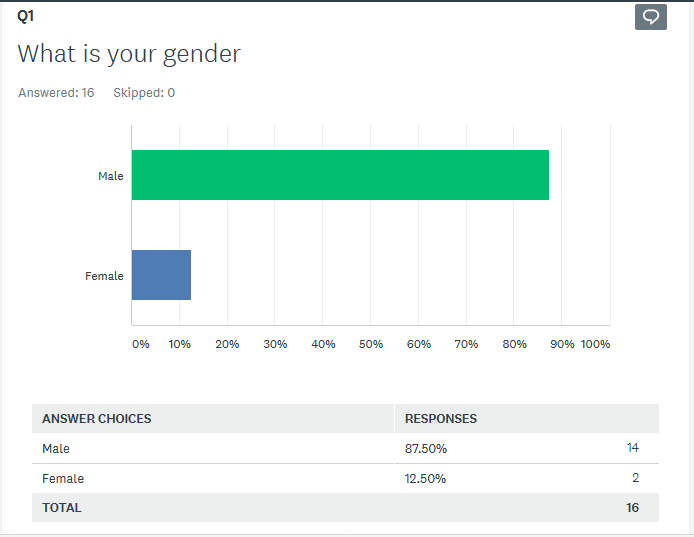

Answers to Each Question
Do you know anybody that is divorced?
93.33% of the respondents were aware of people who have divorced while the rest provided a negative feedback (see chart 2).
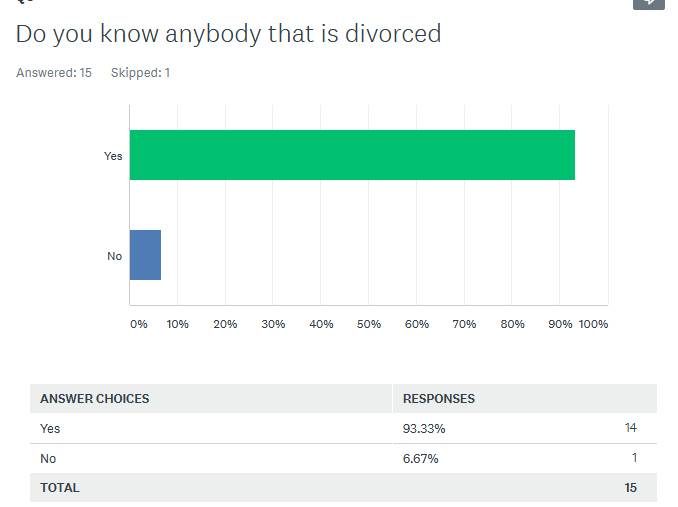
Do you think that divorce should be harder to option?
50% of the respondents agreed that divorce should be harder to option while 14.29% of the respondents thought otherwise. The rest slightly agreed (see chart 3).
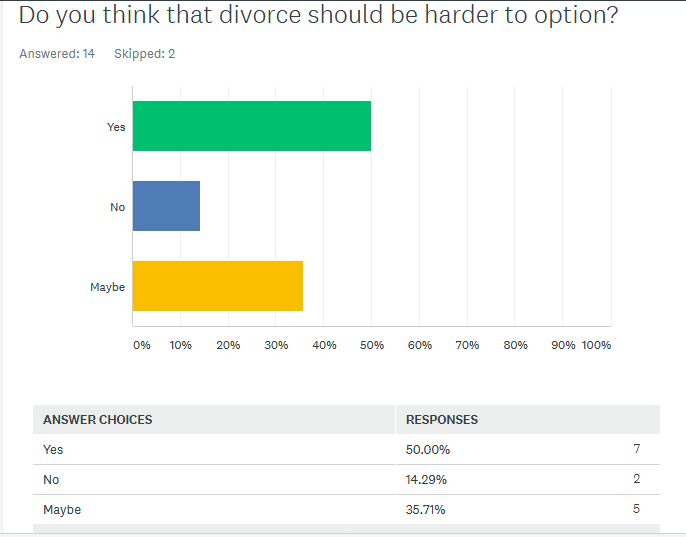
Do you think the rate of divorce is increasing?
78.57% of the respondents think that the divorce rate is increasing while 14.29% were indifferent (see chart 4).
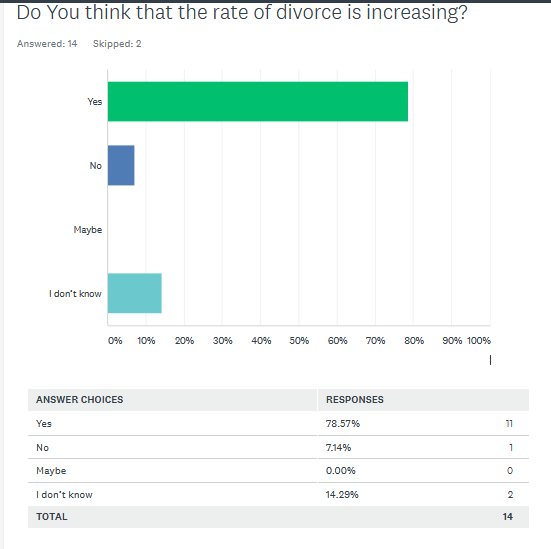
What are the major causes of divorce?
42.86% of the respondents agreed that the husband, wife, and children are the major causes of divorce. 14.29% of the respondents blamed the husband while 21.43% blamed the wife and children (see chart 5).
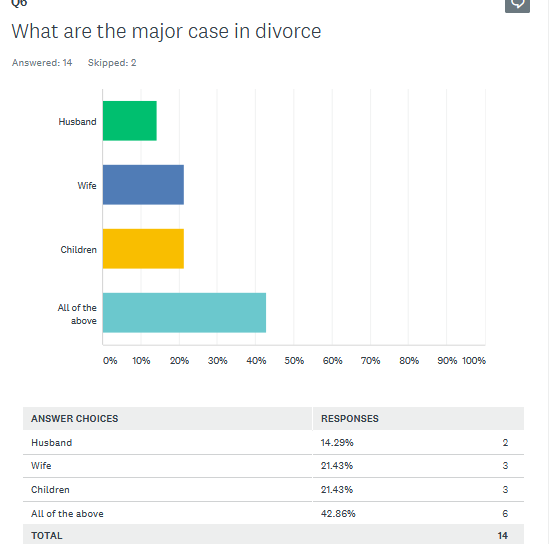
What are the reasons for divorce?
71.43% of the respondents blamed family issues as causing divorce while 21.43% suggested stress. Only 7.14% of the respondents indicated other factors (see chart 6).
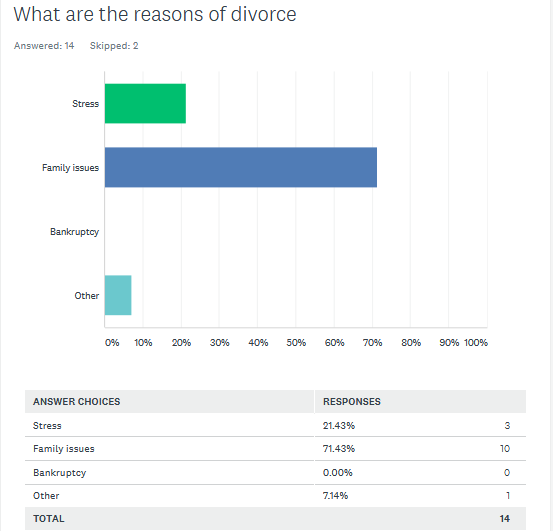
What are the options to stop divorce?
Problem discussion was identified by 57.14% of the respondents as an option for stopping divorce. 28.57% of the respondents suggested apology and admitting mistakes while 7.14% cited having another child and inviting a partner to a luxury dinner (see chart 7).
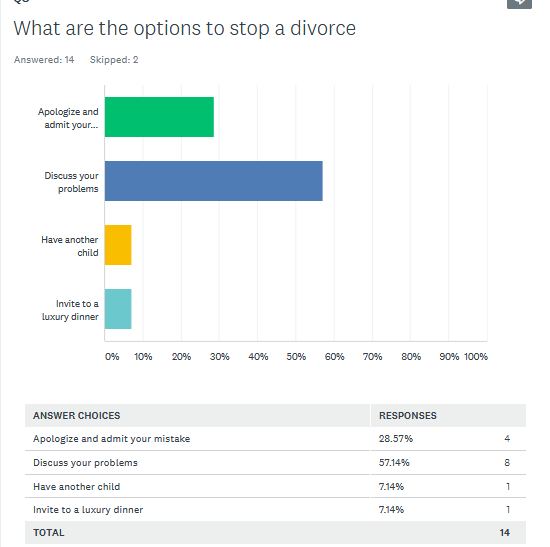
What are the benefits that the societies have when there are no divorces?
57.14% of the respondents indicated that the main benefit is keeping the family together while 28.57% suggested no conflict between families. The rest cited no heartbreaking (see chart 8).
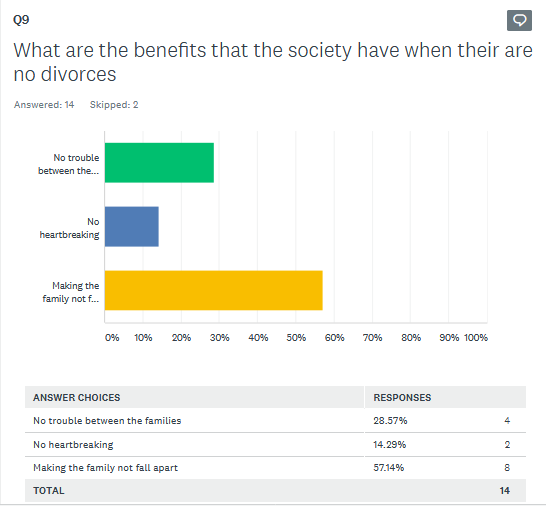
So should divorce be harder to get?
53.85% agreed that divorce should be harder to get while 23.08% were indifferent. The rest did not agree (see chart 9).
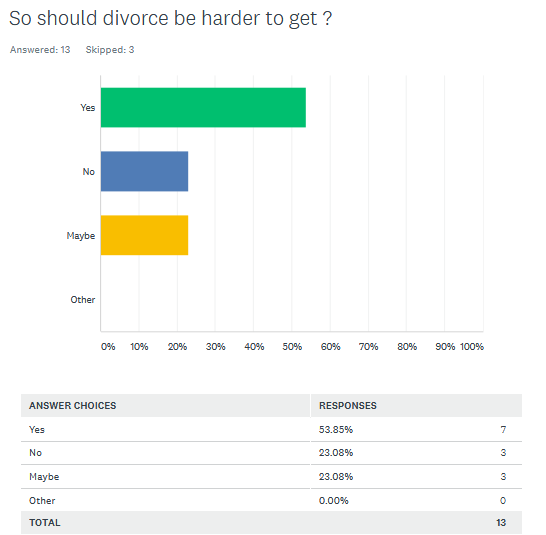
The impacts of divorce identified by the respondents include broken families as couples are forced to live apart. This also subjects children to stress as they have to witness and live without one of the parents. Moreover, divorce is associated with a change in economic status as couples are made to divide their wealth or property (Scott et al. 141). The literature review indicated that increasing rate of divorce has put strain on the government resources channeled towards family upkeep and wellbeing. In addition, divorce is associated with increased single parenthood as many children are subjected to a stressful upbringing (Eaton 37). More than 60% of the respondents have suggested that divorce should be made harder to protect the disintegrating family institution. Moreover, the benefits associated with reduced divorce would increase and make the marriage institution stable.
Recommendations and Conclusion
Recommendations
Based on the above findings, there is a need to amend the Matrimonial Causes Act of 1973 to make the divorce process prolonged and tedious as a strategy for discouraging easy annulment of the marriage institution. For instance, expanding the fact sheet and elongating the separation period to five years would make the divorce process hard to go through (Gravningen et al. 15). Another recommendation is institutionalization of a conflict resolution department within the judicial system to attempt to bring the couple together, even during divorce proceedings (Figley 41). Moreover, strengthening of the family institution would improve conflict resolution and management of expectation between the couples. A stronger family institution would ensure that couples are supported during conflict to create an ideal environment for reconciliation (Eaton 39).
Conclusion
The research study has succeeded in establishing that divorce rate is on the rise and there is a need to curtail this trend. Through an online primary survey, the findings indicated that divorce is affecting the family institution by subjecting the separating couple to stress. The survey results conform to the findings in the literature review on the causes of divorce and a need to reduce it.
Works Cited
Eaton, Mariah. “Negative Effects of Divorce and Possible Intervention Program Development and Improvement.” The BYU Undergraduate Journal in Psychology, vol. 13, no. 1, 2018, pp. 34-48.
Figley, Charles. Divorce Therapy. Taylor & Francis, 2014.
Gravningen, Kirsten, et al. “Reported Reasons for Breakdown of Marriage and Cohabitation in Britain: Findings from the Third National Survey of Sexual Attitudes and Lifestyles (Natsal-3).” PLoS ONE, vol. 12, no. 3, 2017, Web.
Scott, Shelby, et al. “Reasons for Divorce and Recollections of Premarital Intervention: Implications for Improving Relationship Education.” Couple Family Psychology, vol. 2, no. 2, 2013, pp. 131-145.